Archives
now browsing by author
RSU Nursing Student Receives Prestigious IHS Scholarship

Crystal (Thaxton) Dombrovski has recently been named a recipient of a prestigious Indian Health Services (IHS) scholarship.
The IHS Scholarship is a highly competitive scholarship for federal or state-recognized American Indians and Alaska Natives. On average, they receive 3000 applications for 150 scholarships. Students are evaluated based on grades and essays and then ranked among their peers to determine who receives the scholarship. Dombrovski, of Claremore, is a member of the Delaware Tribe of Oklahoma.
There are three different categories and awards vary by category and the school the recipient attends. The total award amount received approximates $30,000 for the academic year, covering tuition, fees, books and a travel award and monthly stipend. The IHS scholarship is awarded to students who are planning on working in underserved disciplines in the medical field. For nurses, it is geared towards students who plan on serving in areas that exhibit the need for registered nurses.
Dombrovski, an Associate Degree Nursing student wants to specialize in diabetes education focusing on educating the individual and community. “There is a huge disparity in the health of our native people and the dominant culture and I want to do my part to narrow that gap,” Dombrovski said, adding that after graduation, she plans on obtaining a Bachelor’s degree in nursing and eventually a Master’s degree in nursing.
Delaware War Mothers Seeking New Members

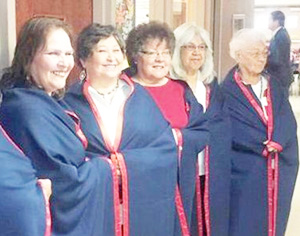
DELAWARE WAR MOTHERS CLUB
Representing and honoring our
military relatives.
If you are a female Native American wanting to represent a veteran OR a female Non-Native American wanting to represent a Native American veteran and would be interested in joining please come to our next meeting or contact Bess Marler, Vice President at 918-440-1955, Tonya Anna, President at 918-533-8035 or send an email to us at delawarewarmothers@yahoo.com.
Delaware War Mothers Club meets every third Monday of the month at 5:00 pm in the dining hall at the Community Center.
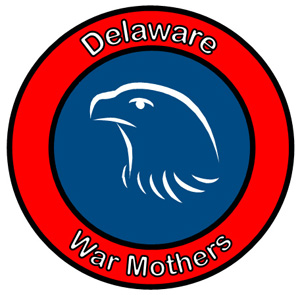
- The eagle represents all military branches.
Black, Red and White are Delaware Colors.
Red, White and Blue are the Delaware War Mothers Colors.
Red is the color of the blood of all people as we are all related.
The circle signifies the circle of life as there is no beginning and there is no end.
Like Our New Look?
We hope you like the new look of our web site; we are very proud of it. We do realize, however, that some things are in different places, so here is a guide of where to look:
Top Menu
Look here for basic information about our various departments, services, and government. This includes links to pages containing application forms for services, descriptions of programs, contact information for tribal government and staff, and archives of major documents as well as minutes of Council and Trust Board meetings (on the Meetings and Minutes page under Tribal Government).
News Ticker
Scrolling news with the very latest announcements, including closings and meeting changes.
News and Events, Culture and Language, Our Community, Tribal Newspaper
Look here for ongoing news stories, announcements, and various other information.
News and Events has regular posts of tribal business, as well as news of general interest to our membership. Our Community has more local stories concerning events and accomplishments of our tribal members. But check both regularly if you want to keep up to date with the Tribe!
Culture and Language is a set of pages describing the history and culture of the Tribe, mostly created by members of the Tribe’s Cultural Preservation Committee as well as Language Revitalization, Historic Preservation, and Tribal Archives programs. This section will be undergoing extensive expansion during the coming months, so be sure to check it out.
Latest News
Another place to look for some of the most important and relevant stories on the site.
Buttons on the Right and Bottom
Click on these buttons for videos of Tribal Council, Trust Board, and other meetings and events; instructions for how to update your current address to make sure you receive the tribal newspaper, election ballots, and information on the Tribe’s available services; The Chief Speaks (an archive of communications from the Chief to tribal members and others); and a list of “Lost Delawares” (those for whom we may have obsolete addresses, check it for yourself and your family to make sure our Enrollment Office is up to date with your contact info).
There is also an online gift shop and a page where you can provide online donations for specific programs.
Don’t Forget Information at the Bottom of the Page
Did you know that the Tribe has a Facebook page? Click the Find Us on Facebook button to get there. Also note the contact information for tribal headquarters and other locations, ongoing Events calendar, and other useful information including current menus for our Elder Nutrition program and other helpful links for local tribal members.
Suggestions?
Any comments or suggestions are welcome; email them to the Webmaster, Greg Brown, at gbrown@delawaretribe.org.
Dr. Dennis Wiedman Visits Tribe

Dr. Dennis Wiedman, Associate Professor of Anthropology at Florida International University, once again visited the Delaware Tribe on July 17 and 18. He is in Oklahoma doing research on the difficulty Indian people had in being able to continue the use of their sacrament in the Native American Church.
Dennis first came to Oklahoma in his late teens in the late 1960s. His first trips were financed by selling beads and other supplies to Indian people and in turn buying Indian-made goods to take back to Florida. One of the main people Dennis worked with was tribal elder Nora Dean of Dewey, Oklahoma. He was also given a great honor by being taken as a son by tribal member Charlton “Steve” Wilson, and he later served as a pallbearer at Steve’s funeral.
Over the years from studying Native American Church practices and working closely with Nora he began to notice the disastrous effects of diabetes on the native population. He then began his study into diabetes and the Indian people, receiving his Ph.D. in Anthropology from the University of Oklahoma for his work on Indian diabetes. He continues to research and write articles on Native American health.
During his visit to Delaware tribal headquarters he met with Chief Paula Pechonick with whom he discussed his past work with tribal elders.
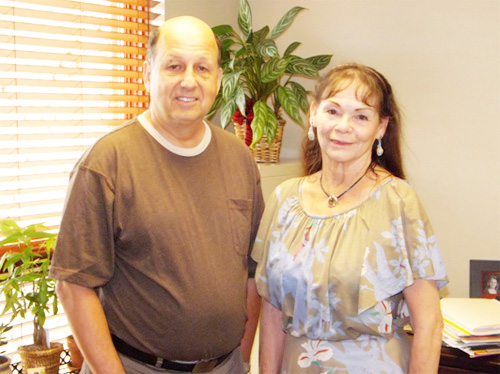
- Dr. Dennis Wiedman with Chief Paula Pechonick.
Dennis also met with Tribal Archivist Anita Mathis, and contributed a number of his articles to the tribal library, and with Tribal IT Director Greg Brown to discuss distance-learning class procedures.
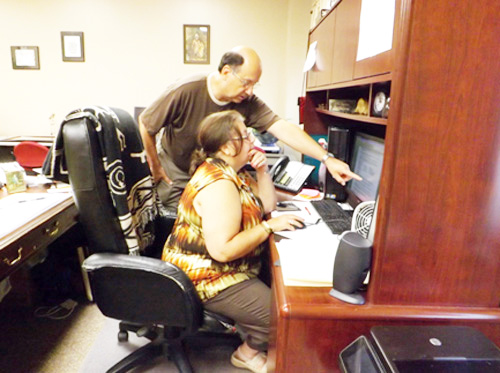
- Meeting with Tribal Archivist Anita Mathis.
During his visit he was able to connect with Housing Inspector Walter Dye, an old friend, to discuss people they both knew who were Native American church participants. He also chatted with Bonnie Thaxton, Mary Watters, and Jan Brown.

- Jim Rementer and Dennis Wiedman at Nora Dean’s home in 1970.
Dennis commented on how glad he was at the warm reception he received by present tribal leaders and compared it to the warm reception he had from the previous generations during his years of study here in Oklahoma. We hope to see him back here soon.
–Contributed by Jim Rementer
Purchase of Property in Lawrence, KS
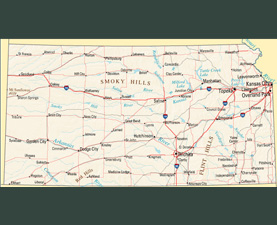
On July 10, 2013 The Delaware Tribe of Indians, through its wholly owned business subsidiary LTI Enterprises LLC, purchased approximately 87 acres of agricultural land in Lawrence, Kansas. The Delaware Tribe had a historic presence in the area, residing on a reservation between Lawrence and Leavenworth between 1830 and 1866. The federal government forced a move of the tribe to Oklahoma after the Civil War. The Lawrence property is seen as an investment in the future as the tribe promotes its theme of “Return to Kansas.”
The federally-recognized Indian tribe has offices in Bartlesville and Chelsea, Oklahoma and also Emporia and Caney, Kansas. They provide government and social services to their members and other Native Americans. Tribal leaders are expanding their service area to provide more social and economic benefits to the state’s American Indian population. Future plans include housing, child care, and a medical clinic.
For more information please send all inquiries to: tribe@delawaretribe.org.
July 23, 2013
Press Statement, Delaware Tribe of Indians
Regarding purchase of property in Lawrence, KS
Sculptor Chris Booth Visits Tribal Headquarters
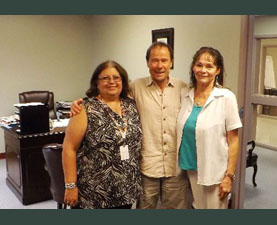

- Renowned New Zealand sculptor Chris Booth visited Tribal Headquarters in early July to discuss an upcoming commissioned sculpture for the Storm King Art Center in southern New York (http://www.stormking.org/). Here he is with Tribal Archivist Anita Mathis and Chief Paula Pechonick.
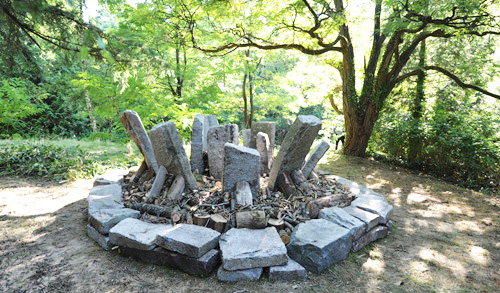
- For more information about Chris Booth’s work, go to his web site at http://www.chrisbooth.co.nz.
Elders Committee Elects New Officers

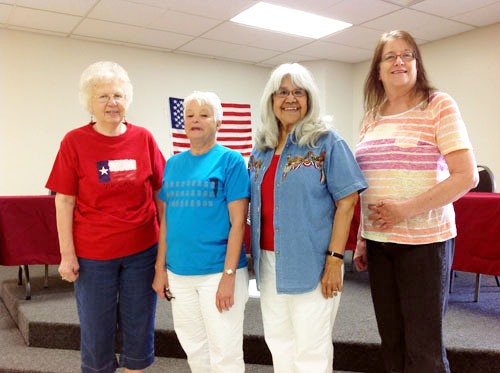
- On July 1, 2013, new officers were elected for the Elders Committee. Officers include (left to right): non-voting Secretary Mary Randall, vice chair Bonnie Jo Griffith, chair Mary Watters, treasurer Janifer Brown.
Proposed Trust Board Document
Proposed Revised Trust Document of the Delaware Tribe of Indians
WHEREAS, The Delaware Tribe maintained a governing Council before and after the Tribe’s moving to Indian Territory in 1867-89, and:
WHEREAS, In September 1990 The Delaware Tribe of Indians were not on the list of federally recognized tribes possessing governmental powers, and
WHEREAS, The Delaware Tribal members approved the original Trust Document of the Delaware Tribe of Indians to establish an entity to which the BIA would release Delaware judgment funds for management and indirectly support the Delaware Tribal Government, and
WHEREAS, In 2009 The Delaware Tribe of Indians reacquired their federal recognition status as a functioning government and,
WHEREAS, The Delaware Tribal Council is the governing body of the Delaware Tribe of Indians, the Constitution of the Delaware Tribe of Indians is the governing document of the Delaware Tribe, and
WHEREAS, We, the Delaware Tribe of Indians, a/k/a LENAPE, associated with the Cherokee Nation in accordance with Article II of the Delaware Agreement, dated April 8, 1867, in order to preserve our Delaware organization, and;
WHEREAS, as it had become expedient and necessary for the release of the 10% Judgment Funds provided for in the Act of Congress dated October 3, 1972, P.L. 92-456, 86 Stat. 762, 25 U.S.C. § 1294(b}, and;
WHEREAS, both the Cherokee Nation and the Secretary of the Interior have committed themselves to the fact that the Cherokee Nation will not interfere with or be called upon to approve, administer or oversee the administration, purpose, or use of such funds, and;
NOW THEREFORE BE IT RESOLVED, the following Document of the Delaware Tribe of Indians is hereby declared to be the formal expression of the procedure to administer the judgment funds of the Delaware Tribe of Indians appropriated by the Act of December 26, 1969 (83 Stat. 447, 453) (unclassified), to pay a judgment in favor of the Delaware Tribe of Indians in Docket 298, and in Docket 72, together with any interest thereon in the above referenced Act of Congress, dated October 3, 1972.
THEREFORE BE IT FURTHER RESOLVED; that any future judgment funds that may be placed with the Board for governing by consent of the Delaware Tribal Council and/or the Delaware people by referendum vote shall be administered by the Board. Also any funds donated, received by grants, or fundraisers that are specifically received for programs shall be administered by the Board.
ARTICLE I – Authority
The Supreme Authority of the Delaware Tribe of Indians is vested in the tribal members, (as defined in Article II of the Constitution of the Delaware Tribe).
A. The Members of the Delaware Tribe of Indians, in 1990, established the Delaware Trust Board, to administer judgment funds when released to the Tribe by the BIA for Dockets 72 and 298.
B. Any future judgment funds, donations, grants, etc., that are delegated to the Trust Board by the Tribal Members and/or the Delaware Tribal Council shall be administered by the Board.
C. The members of the Delaware Tribe of Indians (as defined in Article II of the Constitution of the Delaware Tribe) delegated to the Delaware Tribal Council the authority to govern the Tribe and take care of all other business of the Delaware Tribe.
D. Business: The sole and only methods of conducting business under this document shall be limited to:
1. The elected Trust Board as delegated authority by the Delaware people by approving this document, as provided herein.
2. The members voting by referendum; or the members meeting in General Council and the members voting by referendum;
E. General Council: as herein used shall mean a meeting or gathering of all members of the Delaware Tribe of Indians who assemble in one geographic location, after due and proper notice has been given.
1. The General Council shall convene annually on any Saturday during the month of November of each year at which time the Chair of the Trust Board shall make a “Trust status” address. Notice of the General Council meeting shall be given by the Chief and Tribal Council, as stated in the Delaware Constitution Article XI, not less than thirty (30) days nor more than forty-five (45) days preceding the meeting through the United States Postal Service and by public notice. If any matter is found relevant the matter shall be considered. If found not relevant the matter shall not be considered.
2. A quorum of not less than 100 voters shall be convened before any business of the General Council can be conducted. Procedures for the conducting of business of the General Council shall be consistent with Roberts Rules of Order Revised, unless in conflict with this document, the Delaware Tribal Constitution, or the Constitution of the United States of America.
3. Any action passed by General Council, regarding the Trust Board, must be confirmed by a referendum vote of the people.
F. Trust Board
1. There was created, by the Document approved on September 21, 1990, a representative body, which is known as the Delaware Trust Board, hereinafter referred to as “Trust Board.”
2. The Trust Board consists of one (1) Chair and six (6) members, all of whom must be registered voters within the Delaware Tribe. Three (3) of the six (6) members shall be designated as the following officers: Vice-Chair, Secretary and Treasurer.
3. Trust Board managerial functions, including the employment of workers, as needed, and the execution of routine Trust Board business functions, shall be delegated to the Trust Board.
4. The Trust Board shall meet at least once per month at a time and place designated by the majority vote of said Board at the previous meeting. All meetings of the Trust Board shall be held in accordance with Roberts Rules of Order Revised, unless in conflict with this document, the Delaware Tribal Constitution, and the Constitution of the United States of America.
5. All meetings of the Trust Board shall be public, except:
a. when matters of personnel and their employment are discussed;
b. when the question of moral turpitude of any Trust Board member is discussed; or
c. when the decorum of the audience shall prejudice orderly administration of business.
Such exceptions above will allow the Board to go into executive session In the event that consideration of a subject shall take place in executive session, the vote shall take place in an open meeting.
6. No action shall be taken at any Trust Board meeting unless there is present a quorum, which shall be four (4) members of the Board.
7. The Chair of the Trust Board shall call and conduct all regular and special meetings of the said Board. The chair of the Trust Board shall exercise his/her voting right only when it will affect the outcome (i.e., break tie votes of the Trust Board).
8. The vice-chair, in the absence of the chair, shall perform the duties of the chair, assuming all the duties, privileges, and responsibilities of the chair.
9. The secretary of the Trust Board shall correctly record and maintain all proceedings of the meetings of the said Board and shall upon request, make records available to members of the said Board and tribal members for inspection during regular business hours and send a copy of each to the superintendent of the Tahlequah Agency of the Department of the Interior, Bureau of Indian Affairs. In the absence of the chair and vice-chair the secretary may conduct the meeting, if a quorum is present.
10. The Treasurer shall have direct supervision over the accounting department in regard to any monies administered by this Board. All monies entrusted in his/her care are in a special account and all disbursements therefrom are made by a check. All checks so issued shall be signed and properly countersigned by the properly designated trust officials before distribution.
a. The treasurer, working with the Tribal accounting department, maintains the formal accounting system for trust funds, which includes the accurate accounting of receipts and disbursements of said funds and shall present monthly reports to the Trust Board. The treasurer shall make an annual report at General Council. The treasurer shall make all Trust accounts and records available to the Superintendent at all times for inspection and/or audit.
1. The fiscal year shall begin on January 1 and end on December 31.
2. Each program will submit an annual budget to the treasurer. The treasurer shall then, with assistance from accounting, prepare an annual budget and supplements, thereto administering the judgment funds and consistent with the Plan as set forth in Article III of this Document. The Trust Board will approve the annual budget and present it to Tribal members in the Delaware Indian News and on the Delaware Tribe web site (www.delawaretribe.org). Upon approval chair of the Trust Board shall submit the annual budget to the Secretary of the Interior for the Secretary’s review.
11. The members of the Trust Board consist of those persons elected to the Office of Chair or member of the Trust Board in a duly called election in accordance with Article IV – Elections of Trust Board.
E. Tribal Records: All expenditures of Judgment Trust Funds shall be a matter of public record open to all tribal members at all reasonable times. Official minutes and reports of the General Council, the Trust Board and any of their programs shall also be available to all tribal members at all reasonable times.
1. Any reports, minutes or other information pertaining to matters of personnel shall remain confidential to the extent necessary to protect the individual rights of the person or persons involved. However, the personnel decision of the Tribal entity shall be a public record available to review by all tribal members at all reasonable times.
2. Tribal members shall be allowed reasonable arrangements to copy open Tribal records, subject to appropriate federal law. The cost of such reproduction shall be born by the tribal member requesting reproduction, unless waived. Such cost shall not exceed that charged by local photocopying companies.
ARTICLE II – Eligible Program Recipients
All members of the Delaware Tribe of Indians, as determined in Article II of the Constitution Delaware Tribe of Indians, are eligible to receive program benefits. All program applicants must meet the individual program guidelines.
ARTICLE III – Program Plan
The Delaware Trust Board sets forth this plan to administer the Delaware Judgment Fund Distribution Plan as provided in Public Law 92-456, any additional funds from future judgment settlements, donations, grants etc. as determined by the Delaware people. This plan establishes perpetual funding for the operation of programs and services as provided in this plan:
A. Purpose of the plan is:
1. To safeguard the assets of the Delaware people administered by this plan.
2. To establish rules and regulations for administration of programs.
3. To ensure that every eligible Delaware Tribal member has an opportunity to benefit from the use of the tribal assets, as described in this document, and investments. The plan will identify general guidelines to ensure effective delivery of services to the Delaware people.
B. Definitions
1. Board shall mean Delaware Trust Board
2. BIA will be used to mean Bureau of Indian Affairs
3. Funds shall mean any funds supervised by the Board.
4. Tribe shall mean Delaware Tribe of Indians.
C. Background
On December 26,1969, the United States awarded a claim to the Delaware Tribe of Indians in Docket 298, with accumulated interest. The claim was a settlement for the Delaware outlet in Kansas in payment for lands taken in 1856 and 1857 and sold under Treaty of 1854 (10 Stat. 1048 involving sale of the Delaware Trust Land).
The funds not apportioned to the Absentee Delaware of Western Oklahoma (aka. Delaware Nation) were placed to the credit of the Delaware Tribe in the United States Treasury and were to be administered as follows: 90 percent of the funds were distributed in equal shares to each person enrolled pursuant to subsection 2(c) (1), and 10 percent remained to the credit of the Tribe in the United States Treasury, and was designated to be advanced, expended, invested or reinvested for any purpose that may be authorized by the entity as described in this document.
D. Methodology:
This plan is the product of a series of meetings, planning and research by the Delaware Trust Board, Tribe and Tribal Staff. The original plan was implemented as follows:
1. For the purpose of this document the definition of assets refers to Delaware Judgment Funds as provided in Public Law 92-456, any additional funds from future judgment settlements assigned to the administration of this Board,
2. The original Delaware Judgment Funds, approximately $1.5 million plus accumulated interest were placed under the supervision of the BIA.
3. The Board removed all except $50,000 from the supervision of the BIA and invested it in secure interest bearing accounts,
4. All money under the supervision of the Board shall be placed in secure interest bearing accounts.
5. The annual earned interest is used to fund the programs and services as presented in this document.
6. All money under the supervision of the Board shall be audited at the conclusion of the fiscal year by an independent certified public accountant.
7. Only registered members of the Delaware Tribe of Indians, as provided in the Delaware Tribal Constitution, are eligible to receive services and programs presented in this plan.
8. All funds allocated to a program within this plan that are not expended at the conclusion of the fiscal year shall be carried over to be used by that program in the next fiscal year in addition to the new years budget.
9. The Board reserves the right to transfer the investment management of the Delaware Judgment Funds from the supervision of the BIA to a private sector entity {as provided in Public Law 92-456, Section 4 (a)} upon approval of a properly submitted resolution to the Bureau of Indian Affairs. Such resolution and transfer shall require the approval of the BIA.
Neither the United States nor the Secretary of the Interior shall be liable, because of the Secretarial approval of an investment decision under this plan, for any losses encountered within such and investment decision.
10. The Board reserves the right to withdraw funds from the principal of the Funds provided:
a. The Board shall require the approval of the BIA and a referendum vote of the Delaware people over the age of 18 years. Approval requires a 2/3rd majority of votes cast.
b. Any withdrawal shall not exceed twenty percent (20%) of the total principal of the funds and may not reduce the principal below a value of $3.8 million.
c. There shall be no more than one withdrawal from the principal of the funds during the fiscal year.
E. Program Plan Distribution
1. Community Service 30%
2. Education 25%
3. Cultural Preservation 10%
4. Elders 5%
5. Veterans 5%
6. Tribal Operations 15%
7. Reinvestment 10%
100%
F. Program Parameters
The Board shall determine the duration, eligibility requirements, commencement date, budget amounts and rules and regulations for each of the selected distribution areas. Each program will develop an annual budget to be approved by the Board and presented to Tribal members in the Delaware Indian News and on the Delaware Tribe web site (www.delawaretribe.org).
1. Community Services Program—30%
The Community Services Program will promote the general welfare and well being of the members of the Tribe through support services and technical assistance. The supportive service will meet the need for Delaware Family Assistance and will provide a Central Information-Referral Service component. The services will be available on an emergency basis and will provide such services as financial assistance. This program will be national in scope to assist enrolled Tribal members as families, individuals and with community resource referral service component. This program will be flexible and available to all ages.
The Board will establish a committee to develop and oversee the program. It will assign one of the Board members to be chairman. Guidelines for available services will be available from the Tribal Center and on the Tribal Web site (www.delawaretribe.org).
2. Education Program—25%
The Education Program shall provide financial and technical support to Tribal members of all ages to promote educational endeavors, including but not limited to higher education scholarships. This program will be national in scope. The Board will establish a committee to develop and oversee the program. It will assign one of the Board members to be chairman. Guidelines for available educational services are available from the Tribal Center and on the Tribal Web site (www.delawaretribe.org).
3. Cultural Preservation—10%
The Cultural Preservation Program will provide a centralized system to maintain the language, ceremonies and traditions of the Lenape. This program will include the establishment of a museum, a library, ceremonial grounds, cemeteries and learning resource center for the Delaware people.
The Board will establish a committee composed of tribal elders, historians, staff members and volunteers to implement the program. One of the Board members will be appointed chairman.
4. Elder Committee—5%
The Board will establish a committee headed by a member of the Board to address elder services, issues and needs. The committee will establish guidelines and goals to be achieved.
5. Veterans Committee—5%
The Board will establish a committee headed by a member of the Board to address veteran services, issues and needs. Chair or co-chair shall be a veteran. The Committee will establish guidelines and goals to be achieved.
6. Tribal Operations—15%
The purpose of this program is to provide an administrative structure of operations that will implement and maintain the various services called for in the Plan. These funds will be transferred to the tribal accounting department to provide administrative, accounting and staff support to all Trust programs. The annual audit will be paid for by the Board from each program according to the percentage received by each.
7. Reinvestment—10%
The Reinvestment Program will provide a continuous growth of the financial reserve and enhance the concept of a perpetual funding sources for the Delaware people. The Board, on an annual basis, will reinvest ten percent of the annual accumulated interest on the principal amount back into the principal.
ARTICLE IV – Election of Trust Board
A. Officers and Terms of Office
1. Each elected chair or Trust Board member shall serve staggered terms of four (4) years.
2. Elections of Trust Board members shall be by referendum vote (ballots sent to all eligible Delaware voters with current addresses on file).
3. In concurrence with the Constitution of the Delaware Tribe of Indians, all members, eighteen (18) years of age or older, who are registered to vote, may vote in all elections and sign petitions.
4. Public notice of the date of election and designation of polling places shall be given at least thirty (30) days and not more than forty-five (45) days prior to the date of elections. Notice shall be given through the United States Postal Service to all members of the Delaware Tribe of Indians eligible to vote and by public notice.
5. Declaration of Trust Board candidacy shall be for either of the following positions: (a) Chair of Trust Board; or (b) member of the Trust Board.
6. Members elected to the Trust Board shall take office at the next regular meeting of the Trust Board after the election at which time they shall take an oath administered by the Chair. In absence of the chair, the Vice-Chair, or Chair Pro-Tem elected by a majority of the Trust Board shall administer the oath of office.
7. The Trust Board, after being installed in office, shall elect by majority vote of its members, a vice Chair, secretary and Treasurer.
8. Vacancies of elected Board positions shall be announced at the Trust Board meeting at which the resignation is announced. Such vacancy shall also be posted on the Delaware Tribal web site for a minimum of 21 days. Tribal members interested in being considered for such position shall submit in writing their interest and qualifications to the Trust Board and be present at the next regular meeting. The position shall remain vacant until the next regular meeting of the Trust Board, provided applications have been received and public notice has been given. Candidates not elected in the previous Trust Election shall be placed in the vacant seat according to most votes received that election, provided they submit an application for the position. If no previous candidates apply, Trust Board shall then appoint a tribal member, who has submitted an application, receiving the majority of the votes of the Trust Board then assembled, to the vacant post. The member chosen in this manner shall serve out the unexpired term of the office.
9. If the Trust Board shall fail to give proper notice of the election or in case a regular election has not been held, the Election Board, upon receipt of a valid petition signed by at least 100 registered voters shall call such election and shall give thirty (30) days notice, setting the time and place of the election.
B. Election Board.
The Election Board, chosen jointly by Tribal Council and Trust Board, shall consist of five (5) tribal members who shall not be members of the Trust Board, nor candidates for or hold any elective positions within the Delaware Tribe of Indians or employed by under contract to the tribe. The Election Board shall have the responsibility for overseeing elections and shall serve for a term of one (1) year or until successors are duly chosen and installed.
C. Election Regulations.
The Election Board, first selected in accordance with this Trust Document, shall present, for approval to the Tribal Council and Trust Board, proposed election regulations which shall provide for, among other things, walk-in balloting, mail-out secret balloting, voter registration and procedures for settling election disputes. Upon adoption by the Tribal Council and Trust Board, the election regulations shall remain in effect until amended by the Tribal Council and Trust Board.
1. The Tribal Council and Trust Board shall, in an election year, establish the location, date and time for the election.
2. Elections shall be held every even year the first Saturday of November to coincide with the Tribal Council elections.
3. Elections of Trust Board members shall be by referendum vote (ballots sent to all eligible Delaware voters with current addresses on file).
ARTICLE V – Removal from Office
A. Any member of the Trust Board shall be subject to removal from office for willful neglect of duty, corruption in office, habitual substance abuse, incompetency, prior or current conviction of a felony or convictions involving moral turpitude, provided such offenses occurred while the member is in office.
B. Any member of the Trust Board not in attendance two consecutive times with unexcused absences, or a total of four regularly scheduled Board meetings, may be subject to removal from office.
1. Excused Absences
a. Illness—Board member, immediate family (spouse, children, parents, siblings)
b. Accidents—automobile accidents, unexpected breakdowns, i.e, flat tire, motor problems that leaves the Board member without transportation
c. Death in family
d. Board member shall provide documentation (doctor’s note or bill, receipts for auto problems, photos or personal statements).
C. The Trust Board shall make rules as are necessary for carrying into effect the provisions of this article, insuring therein that due process is afforded to all persons.
ARTICLE VI – Initiative, Referendum and Amendment
A. Reserved Power
Notwithstanding the provisions of Article I of this document, the members of the Delaware Tribe of Indians reserve to themselves the power to propose resolutions, regulations or Trust Document amendments and to enact or reject the same at the polls, and also reserve power at their own option to amend or reject any act of the Trust Board. The power of initiative, referendum and amendment shall be exercised by petition. The Trust Board shall make suitable provisions for carrying into effect the provisions of this Article.
B. Petitions
A valid petition signed by one hundred (100) voting members of the Delaware Tribe shall be required to propose resolutions, regulations or amendments. The petition shall, at the beginning, contain a statement of purpose in clear and concise language. Petitions shall be typed and clearly set forth the proposal. A copy of the petition shall be filed with the Trust Board Secretary and addressed to the Trust Board Chair, prior to obtaining signatures. Petitions not filed will be invalid. Persons signing the petition must print their full legal name, address, and affix their signature. In determining whether the signatures are valid (those of registered voters), only those names, which appear on the same page as the “Statement of Purpose” with the text of the proposal, shall be counted. The Trust Board Secretary shall verify the voting status of all persons signing any petition.
C. Referendum
From time to time certain issues may require a mandate of the registered Tribal members 18 years or older. A referendum petition meeting the requirements of Article VI, section B, and signed by at least one hundred (100) voting members shall require the Trust Board Chair to institute a special election within forty-five (45) days, provided:
1. Referendum election shall be by secret mailed ballots prepared by the Election Committee;
2. The issue or question is clearly and concisely stated;
3. Notice and mailing of such ballots be accomplished not less than thirty (30) days and no more than forty-five (45) days before the deadline for submission of such ballots; and
4. Due process requirements are met, as provided by the Indian Civil Rights Act of 1968, 25 U.S.C., Section 1302.
D. Amendment
This Trust Document of the Delaware Tribe of Indians may be amended by 2/3 majority vote of the registered voters participating in a duly conducted referendum election. If two or more amendments are proposed they shall be submitted in such a manner that electors may vote for or against them separately. No proposal for the amendment of this document which is submitted to the voters shall embrace more than one general subject and the voters shall vote separately for or against each proposal submitted; provided, however, that in the submission of proposals for the amendment of this document by articles, which embrace a general subject, each proposed article shall be deemed a single proposal or proposition.
ARTICLE VII – Ratification
This Trust Document shall become effective upon date of ratification, when ratified by:
Those eligible to vote in Delaware Tribal elections as defined in the Constitution of the Delaware Tribe of Indians Article VI Section 6.
1. Those persons whose name; or Whose lineal ancestor’s name appear on the per capita roll prepared by the secretary of the Interior on April 20, 1906; and
2. Who are eighteen (18) years of age or older and are registered Tribal members.
IN WITNESS WHEREOF, I have hereunto set my hand and caused the Seal the Trust Board of the Delaware Tribe of Indians to be affixed. This Trust Document of the Delaware Tribe of Indians is passed and certified in accordance with this document this _____ day of _______________, 2013 at Bartlesville, Oklahoma.
_______________________________ _______________________________
Chairman of the Delaware Trust Board Secretary of the Delaware Trust Board
Revising the Trust Board Document
What We Are Proposing:
Current events and the age of the present Delaware Trust Document has made it essential for revisions to bring the document up to date. The Trust Board has drafted a proposed revised document and is presenting it to all Delaware tribal members for comments. Once the comment period ends the document will be changed and put out for a vote.
The final draft will be on the ballot in November for ratification by tribal members. The comment period will end August 1, 2013 to allow time for final revisions. The document that will be on the ballot will be printed in the October Delaware Indian News. All tribal members should carefully the proposed revised Trust Document and offer comments if they wish. To view the document, click on the link below.
The Revised Document:
Opportunities for Feedback:
We want to hear your concerns. To make your voice heard, please plan to attend one of the Town Hall meetings to be held in July! Stew, frybread and dessert will be served. Door prizes will be awarded at the end of each meeting. If you cannot attend, videos of the meetings will be available on the tribal web site.
If you cannot attend, you can also send comments to our special email address at trustrevisions@delawaretribe.org.
Town Hall Meetings:
Sat, July 13, 11:00 AM:
Chelsea Boys & Girls Club, 119 North Ash, Chelsea, OK
Sat, July 20, 11:00 AM:
Nowata City County Library (West Room), 224 South Pine Street, Nowata, OK
Sat, July 27, 11:00 AM:
Delaware Community Center, 5100 Tuxedo Blvd., Bartlesville, OK
Explanations and Opinions:
- Proposed Trust Document Revisions
Trust Board Secretary Verna Crawford - Trust Board Information
Trust Board Chairman Chet Brooks - To be or not to be…Elected or appointed…
Trust Board Member Bonnie Jo Griffith - Trust Board Proposed Changes
Trust Board MemberJohn Sumpter - A Counterpoint
Councilwoman Annette Ketchum
National Register Nomination for Delaware Town in Missouri

We are pleased to announce that we will soon be nominating the Delaware Town site (23CN1), located near Springfield, Missouri, to the National Register of Historic Places. You may remember from earlier issues of this newspaper that the Tribe has collaborated with archaeologists from Missouri State University to further more than ten years of excavations and surveys of the area. The information gained from excavations at Delaware Town will significantly contribute to our understanding of our Delaware and national heritage, as it represents the only archaeological excavation of a residence associated with the Delaware occupation in the Missouri Ozarks. This site is situated within the historical context of the early movements of the Delaware and other Eastern Woodland tribes to regions west of the Mississippi River in order to continue their traditional lifeways away from the bloodshed and missionary efforts that were increasingly present on the Ohio Valley and Great Lakes frontiers following the American Revolution.
According to the historical literature, some Delaware groups first began moving into the Ozarks, along with other groups of their Shawnee, Kickapoo, Piankashaw and Peoria allies, in the 1780s. They first established villages in the eastern Missouri Ozarks. These Delaware and Algonquin immigrants were slowly pressured to points further west as American encroachment and harassment substantially increased west of the Mississippi following the Louisiana Purchase and the War of 1812. As these allied groups moved into the western Missouri Ozarks, the so-called main body of Delaware who had remained along the White River in Indiana agreed to the Treaty of St. Mary’s, 1818, in which they ceded all land in Indiana in exchange for “a country to reside in, on the west side of the Mississippi.” Then-Missouri territorial governor William Clark assigned the Delaware lands in southwest Missouri on the eastern border of the Osage Reservation. It was at the Delaware Town site that the Indiana Delaware and the Ozark Delaware coalesced in a linear riverine village along the James River from 1820 to 1822, and remained there until leaving for their Kansas reservation in 1830. During these years, Delaware Chief William Anderson, who had risen to prominence amidst the nativistic revivals in the Indiana villages, was looked to as the principal spokesperson for the newly-coalesced James River Delaware. Anderson also provided leadership for the neighboring Shawnee, Kickapoo, Piankashaw, and Peoria villagers who settled in and near the Delaware reservation and subordinated themselves to them, whom they still considered as their “Grandfathers.”
The Delaware Town site is the archaeological remains of what was once a residence associated with this last Delaware and multi-tribal settlement present along the James River from 1821 to 1830. Delaware Town can thus significantly contribute to our understanding of this important but underrepresented time period in American history. Current information about this time period is based largely on the archival record and historical publications that have interpreted such collections. I am not aware of any archaeological interpretations that have been produced based on the material culture from these Eastern Woodland settlements beyond the survey reports and conference papers that have come from research on the Delaware Town site. Although the Delaware Town site and others like are known and documented, their presence and significance may be underrepresented in the historical and archaeological record due to the often transient nature of these sites (often occupied for a decade or less) and their close similarity in material culture with other, non-Indian, historic-period frontier settlements. Documenting and preserving the Delaware Town site and emphasizing its veiled uniqueness, can thus significantly contribute to our knowledge of the Ozark region’s history. It is the only site of which I am aware that has yielded both archaeological evidence of the experience of Delawares and allied Algonquins in the Ozark region.
The value of this work to the Tribe is that it helps preserve this important component of Delaware history. Archaeological sites are destroyed every day when they are not actively protected. Once successfully added to the National Register of Historic Places, the Delaware Town Site would enjoy further protections under federal law from potential development that is currently threatening the integrity of the site. Who knows what we will learn from this site if it is preserved for the future?
 D5 Creation
D5 Creation